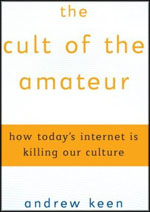Web 2.0 and the cult of lovers - a threat to the society of elites
 Frankly, the provocative book was written by an Internet entrepreneur from Silicon Valley, Andrew Keen. The name alone speaks for itself: “The cult of the amateur. How today's Internet kills our culture. ”
Frankly, the provocative book was written by an Internet entrepreneur from Silicon Valley, Andrew Keen. The name alone speaks for itself: “The cult of the amateur. How today's Internet kills our culture. ”This position has its own explanation. Like many other opponents of Web 2.0 and the collective mind, Andrew Keane is an ardent supporter of elitism. The elitarists sincerely believe that any power should not be in the hands of the crowd, but in the hands of the elite, that is, in the hands of a select, best representative, whether in politics, science or web services. So, the elitarists hate Wikipedia, and the elitarists hate any manifestation of user content on Web 2.0 sites.
To understand the logic of Andrew Keane and similar individuals, you must first familiarize yourself with the scientific definition of this phenomenon .
Elitarism is the concept of the need to divide society into the elite and the masses. According to this concept, the absence of such a division is a sign of underdeveloped society. The elite in this sense is closed, its members do not accept or despise strangers. Elitarism is an aristocratic and deeply conservative outlook.
')
Elitism is a phenomenon close to elitism, but not identical to it. Taking the same elite-mass dichotomy as an initial postulate, supporters of elitism are more liberal, tend to recognize their rights of the masses to a place under the sun. In their understanding, the elite should be open to the most capable people from the lower classes. Here a high level of social mobility is recognized as legitimate and even desirable.
It turns out that the Web 2.0 revolution has affected not just the methods of creating websites, but the very foundations of human civilization - the principles of building a social hierarchy. Enry Keane tells about this in his book. He talks about an “endless digital forest of mediocrity,” which covers everything around as the number of blogs on the Internet doubles every six months. If the trend continues, Keen writes, by 2010 there will be half a billion blogs on the Internet that “can collectively distort and confuse public opinion about anything: from politics to business, art and culture. Blogs have become so ubiquitous that they define our understanding of what is true and what is false, what is real and what is fictional. Nowadays, children no longer see the difference between credible news from objective professional journalists and those scribbles that they read on joeshmoe.blogspot.com. ” The main achievements of our culture - professional newspapers, magazines, music, cinema - under the threat of destruction due to the dominance of low-end amateur content.
Andrew Keane is very concerned about the growing popularity of Wikipedia, YouTube and similar sites, as well as the influence that they have on the younger generation. He does not believe in the collective mind. The crowd is not capable of being clever.
Under the influence of the Internet, our civilization is undergoing irreversible changes, warns Keen. We need to stop this process before it is too late. To coordinate with the writer plan of action can be in his personal blog .
via News.com
Source: https://habr.com/ru/post/6521/
All Articles